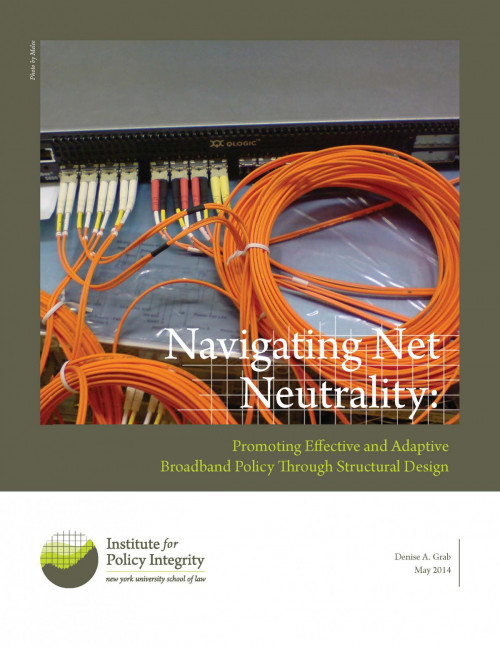-
Oil Train Safety - Public Comments
Driven by growth in the production of oil in the U.S. and Canada, there has been a significant increase in rail transportation of crude oil over the past five years, with a corresponding increase in the number of accidents. Many oil trains pass through sensitive environmental habitats and densely populated areas, and even share track with commuter trains in some regions.
-
Tobacco Products and Consumer Welfare - Public Comments
Policy Integrity recently submitted public comments to the Food and Drug Administration (FDA) on its proposed rule to deem certain tobacco products, such as electronic cigarettes and cigars, subject to regulation. We believe the FDA may be dramatically understating the benefits from consumer behavior changes due to regulation of new tobacco products.
-

Navigating Net Neutrality
The Federal Communications Commission’s ability to protect the open Internet has been limited, due to recent court decisions. This report examines the regulatory options and recommends to FCC a course forward that will best promote the benefits of widespread Internet access.
-
Comments to HUD on Improving Approaches to Affirmatively Furthering Fair Housing
HUD has implemented several recommendations outlined in a regulatory report published by the Institute for Policy Integrity in the proposed Affirmatively Furthering Fair Housing rule. By incorporating our recommendations, HUD has more clearly defined its goals in “affirmatively furthering fair housing,” and has provided metrics and data that municipalities can use to measure their compliance.
-
Comments to OSHA on its Injury and Illness Prevention Program
The Obama Administration is poised to improve worker safety by establishing a nationwide Injury and Illness Prevention Program. But unless it is well designed, the program will leave too many vulnerable to unsafe work conditions.
-
Letter to OIRA on Review Delay
Policy Integrity submitted a letter to OIRA on its long delay in reviewing two rules from the Department of Labor. The rules, Occupational Exposure to Crystalline Silica and Occupational Injury and Illness Recording and Reporting Requirements, have been under review for 764 and 483 days, respectively. OIRA review of rules from the Department of Labor since 1994, the first full year of review under the 90-day framework established by Executive Order 12866, has lasted an average of only 60 days.
-
Michael Livermore Gives Congressional Testimony on the Affordable Care Act
Michael Livermore, director of Policy Integrity, presents testimony today on the Affordable Care Act’s Summary of Benefits and Coverage (SBC) rule to the Senate Committee on Commerce, Science, and Transportation. The testimony will be featured in a hearing entitled, “The Power of Transparency: Giving Consumers the Information They Need to Make Smart Choices in the Health Insurance Market.”
-
Comments to FHFA on mortgage fees
Policy Integrity submitted comments to the Federal Housing Finance Agency (FHFA) on its proposal to increase the guarantee fees that Freddie Mac and Fannie Mae charge for single‐family mortgages in the states with the longest average time between default and a final foreclosure sale. This would mean that the costs charged to homeowners for mortgages will be higher in those states with the strongest judicial and regulatory protections against foreclosure.
-
Comments on Mortgage Servicing Rules
In compliance with the Dodd-Frank Act, the Bureau of Consumer Financial Protection has proposed mortgage regulations to address many of the concerns from the subprime mortgage crisis. Policy Integrity submitted comments to the Bureau on two mortgage servicing rules: (1) the RESPA Rule, which lays out requirements for how servicers must interact with the homeowners whose mortgages they service and (2) the TILA rule, which describes certain disclosures that mortgage servicers must send to their customers at particular points.
-
Comments to the US Sentencing Commission on Sentencing Guidelines
Policy Integrity sent our report, Balanced Justice, to United States Sentencing Commission in response to its call for public comments on possible priority issues for forthcoming amendments to the Sentencing Guidelines. The guidelines are used to set a uniform sentencing policy for individuals and organizations convicted of felonies and serious misdemeanors.
Viewing recent projects in Consumer and Healthcare Protection
